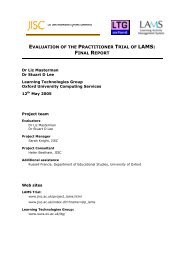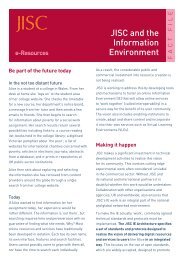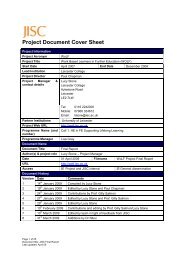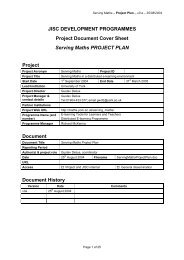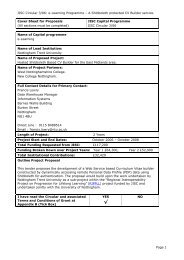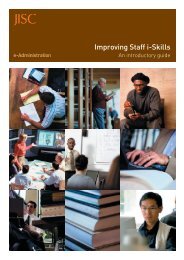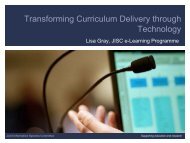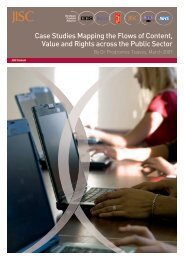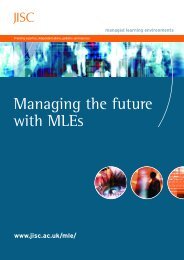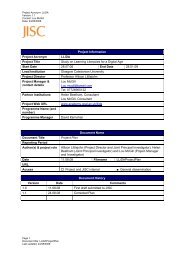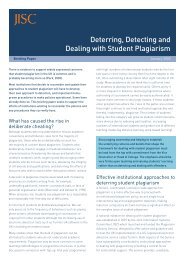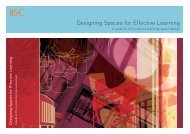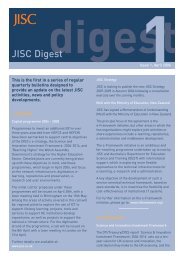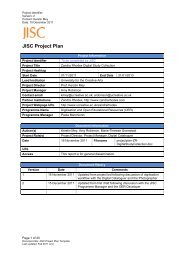e-Portfolios: An overview of JISC activities
e-Portfolios: An overview of JISC activities
e-Portfolios: An overview of JISC activities
You also want an ePaper? Increase the reach of your titles
YUMPU automatically turns print PDFs into web optimized ePapers that Google loves.
e-<strong>Portfolios</strong><br />
<strong>An</strong> <strong>overview</strong> <strong>of</strong> <strong>JISC</strong> <strong>activities</strong><br />
Overview September 2007<br />
Over the last few years the prominence <strong>of</strong> and interest in<br />
e-portfolios in all sectors <strong>of</strong> education has grown, driven in part by<br />
national policy and lifelong and personalised learning initiatives.<br />
The picture has <strong>of</strong>ten been a complex one, with confusion over<br />
what an 'e-portfolio' is. More recently, consensus is gathering, and<br />
clarity is being brought to the discussions, as our experience with<br />
using e-portfolio tools grows.<br />
Fundamentally, an e-portfolio is the product created by learners, a<br />
collection <strong>of</strong> digital artefacts articulating learning, experiences and<br />
achievements:<br />
<strong>An</strong> e-portfolio is a purposeful aggregation <strong>of</strong> digital items<br />
– ideas, evidence, reflections, feedback etc., which 'presents'<br />
a selected audience with evidence <strong>of</strong> a person's learning<br />
and/or ability. <br />
Learners create ‘presentational’ e-portfolios through the use <strong>of</strong><br />
e-portfolio tools or systems, and in the process (depending on<br />
the tools or systems used) can be inherently supported to develop<br />
one or more key skills such as collecting, selecting, reflecting,<br />
sharing, collaborating, annotating and presenting (e-portfolio<br />
related processes). Descriptions <strong>of</strong> e-portfolio use also tend to<br />
include the concepts <strong>of</strong> learners drawing from both informal and<br />
formal learning <strong>activities</strong> to create their e-portfolios, which are<br />
personally managed and owned by the learner, and where items can<br />
be selectively shared with other parties such as peers, teachers,<br />
assessors or employers. <br />
<strong>JISC</strong>-funded projects have been investigating a number <strong>of</strong> issues<br />
around the use <strong>of</strong> e-portfolio tools and systems and technology<br />
supported personal development planning (PDP) in a range <strong>of</strong><br />
contexts.<br />
This paper provides an <strong>overview</strong> <strong>of</strong> all <strong>of</strong> the <strong>JISC</strong>-funded <strong>activities</strong><br />
in this area to date.<br />
<strong>JISC</strong>’s work in this area<br />
<strong>JISC</strong> projects have been working on the use <strong>of</strong> e-portfolio tools and<br />
systems to support a range <strong>of</strong> purposes, for example:<br />
Supporting application<br />
■<br />
Providing a selection <strong>of</strong> material for application for admission to<br />
study or job, induction, appraisal or assessment<br />
Supporting transition<br />
■<br />
Through presenting a richer picture <strong>of</strong> learners’ achievements<br />
on application, and in better preparing for the transition to a new<br />
environment<br />
<br />
Sutherland, S. and Powell, A. (2007), CETIS SIG mailing list discussions<br />
(www.jiscmail.ac.uk/archives/cetis-portfolio.html), 9th July 2007<br />
<br />
Beetham, H. (2005) (www.jisc.ac.uk/uploaded_documents/eportfolio_ped.doc)<br />
Supporting learning, teaching and assessment<br />
■<br />
Supporting the assessment <strong>of</strong> learning, evidencing<br />
competencies or standards for summative assessment.<br />
Supporting assessment for learning, encouraging learners to<br />
present their experiences, achievements and reflections, share<br />
with peers, tutors and employers, and incorporate feedback into<br />
their learning<br />
Supporting PDP and continuing pr<strong>of</strong>essional<br />
development (CPD)<br />
■<br />
Providing scaffolding to support lifelong learners in reflecting<br />
on their current and completed learning, achievements and<br />
experiences, and on goals and opportunities, to guide learning<br />
(informal and formal) and pr<strong>of</strong>essional development over time<br />
These areas <strong>of</strong> e-portfolio usage are not exhaustive and will<br />
inevitably overlap, and are at different stages <strong>of</strong> maturity.<br />
Application<br />
A number <strong>of</strong> projects are investigating issues around application to<br />
university (the numbers in brackets refer to the e-portfolio projects<br />
listed later in this document):<br />
■ Direct support for local schools and colleges (16)<br />
■ Linking with ‘taster’ and preparatory mini courses (17)<br />
■ National UCAS entry system (6, 43, 44)<br />
Other projects are investigating the use <strong>of</strong> e-portfolios for applying<br />
for jobs or work placements and for building CVs (9, 15, 26, 29).<br />
Projects are exploring the use <strong>of</strong> portfolios to showcase work in<br />
a range <strong>of</strong> disciplines, including creative industries (14, 24, 26),<br />
teacher training (10) and health (16).<br />
Transition<br />
Projects exploring how learners can be supported through<br />
transitions have covered areas such as the use <strong>of</strong> an electronic<br />
PDP system to support students as they move from a high support<br />
environment (further education (FE) college) to a low support<br />
environment (higher education (HE) institution) (4), and supporting<br />
the development <strong>of</strong> key skills and study skills on transfer to HE (12,<br />
16, 17, 25).<br />
Learning, teaching and assessment<br />
Projects in the area <strong>of</strong> supporting reflective learning, supporting<br />
formative assessment, and presenting evidence for assessment and<br />
for formal qualifications are:<br />
■<br />
■<br />
Exploring the use <strong>of</strong> mobile devices to reflect and collect<br />
evidence for assessment (20)<br />
Investigating tools to support learners and advisers during the<br />
Accreditation <strong>of</strong> Prior Experiential Learning (APEL) process (21, 27)
e-<strong>Portfolios</strong>: an <strong>overview</strong> <strong>of</strong> <strong>JISC</strong> <strong>activities</strong><br />
September 2007<br />
■<br />
■<br />
Exploring the use <strong>of</strong> portfolios in traditionally reflective/<br />
evidence-based disciplines such as education (10) and<br />
healthcare (11, 16, 24, 26, 28)<br />
Supporting vocational and work-based learners, including<br />
the sharing <strong>of</strong> reflections with mentors and peers (16, 20, 21,<br />
23) and supporting the processes <strong>of</strong> information, advice and<br />
guidance provision to learners (30)<br />
PDP and CPD<br />
Many <strong>JISC</strong> projects have been working in this important area <strong>of</strong><br />
supporting PDP through using e-portfolio related tools and systems.<br />
This work includes:<br />
■<br />
■<br />
■<br />
■<br />
■<br />
Reflection on previous educational experience when starting<br />
new courses (8, 9)<br />
Reflection on skills with respect to career or educational<br />
aspirations (8, 17, 26, 31)<br />
Supporting personal and career development planning (4, 5, 7,<br />
11, 14, 18, 21, 22, 24, 31)<br />
Using tools and systems with a wide range <strong>of</strong> learners in<br />
different situations (8, 9), including implementation <strong>of</strong> the<br />
IMS Accessibility for Learner Information Package (ACCLIP)<br />
specification for screen display preferences to support visually<br />
impaired users (5)<br />
Investigating the presentation <strong>of</strong> work for pr<strong>of</strong>essional<br />
accreditation and appraisal (9, 16, 19)<br />
Technical development<br />
Interoperability and data transfer<br />
Many projects have investigated issues around the transfer <strong>of</strong><br />
learner data between institutions to ease transition for learners.<br />
One project (2) has developed a middleware solution to enable the<br />
transfer <strong>of</strong> learner data between otherwise incompatible systems, a<br />
solution that has been developed further through other projects in<br />
a range <strong>of</strong> contexts (14, 15, 17, 32); others are using Enterprise web<br />
services to draw down learner data from a range <strong>of</strong> institutions into<br />
a learner portal (1), e-portfolio system (41), or CV (29).<br />
Other projects have successfully piloted the transfer <strong>of</strong> standards<br />
compliant learner data between HE and FE PDP/e-portfolio systems<br />
(5, 7), between schools and colleges (13) and between the national<br />
UCAS entry system and an institution (6). However, it has emerged<br />
that the technical standards require further rationalisation in order<br />
to achieve wider take-up. The continued development <strong>of</strong> technical<br />
standards for the learner information held within an e-portfolio is<br />
being coordinated by <strong>JISC</strong> Centre for Educational Technology and<br />
Interoperability Standards (CETIS) through the Portfolio Special<br />
Interest Group (SIG).<br />
Security<br />
Three projects investigated the provision <strong>of</strong> Shibboleth-based<br />
authentication for e-portfolio systems (10, 12, 13).<br />
e-Framework and e-portfolio<br />
The <strong>JISC</strong> e-Portfolio Reference Model project (48) has scoped the<br />
e-portfolio domain (with a focus on transition) and has made a<br />
number <strong>of</strong> recommendations for working towards a lightweight<br />
service-oriented approach, an approach enabled by the <strong>JISC</strong><br />
e-Framework. A range <strong>of</strong> projects have been working to develop<br />
web services in the e-portfolio domain within the e-Framework (11,<br />
29, 30, 43, 44).<br />
Guidance for institutions<br />
A project (46) exploring the legal issues surrounding e-portfolios<br />
and lifelong learner records has produced a range <strong>of</strong> guidance on<br />
issues such as data protection and Intellectual Property Rights.<br />
Others (16, 45) have produced guidance for institutions and specific<br />
staff groups aiming to help them make informed choices about<br />
e-portfolio systems and governance (7).<br />
Work is also progressing with the HE Academy Subject Centres<br />
(47) around subject specific approaches to e-portfolio use, Lifelong<br />
Learning Networks (11, 13, 15, 17, 26, 30, 31), pr<strong>of</strong>essional bodies<br />
(19), employers and sector skills councils (32).<br />
e-Portfolio projects funded by <strong>JISC</strong><br />
Pilot and technical implementation projects<br />
Managed Learning Environments (MLEs) for Lifelong<br />
Learning programme (2002–2005)<br />
www.jisc.ac.uk/elearningfocus/mle<br />
Many projects funded under the MLEs for Lifelong Learning<br />
programme explored e-portfolio use, including 1. NIIMLE, 2.<br />
SHELL, 3. PROSPERO, 4. TransPortALL, 5. Developing Learning<br />
and Teaching Aspects <strong>of</strong> Progress File and Personal Development<br />
Pr<strong>of</strong>ile across HE and FE and 6. Specifying an e-Portfolio: Enhanced<br />
Learner Information for Flexible Admissions and Transitions to HE.<br />
Distributed e-Learning (2005–2007)<br />
www.jisc.ac.uk/pilotsdetail<br />
7. EPICS (North-East regional collaboration around e-portfolio<br />
progression pathways with illustrative case studies)<br />
This project explored PDP practice in the North-East, implemented<br />
e-portfolios in a number <strong>of</strong> institutional contexts and trialled<br />
data transfer between e-portfolio systems. It also investigated<br />
the legal and governance issues <strong>of</strong> a regional shared e-portfolio<br />
infrastructure, and produced guidance in this area.<br />
8. FILE-PASS (Facilitating Independent Learning Using e-Portfolio<br />
and Associated Support Systems)<br />
This project initially investigated the use <strong>of</strong> an Open Source Portfolio<br />
Initiative-based e-portfolio tool with links to information, advice and<br />
guidance resources to reach and support isolated or independent<br />
learners across Cumbria and Lancashire. The project worked with<br />
a wide range <strong>of</strong> learner cohorts, and went on to trial a number <strong>of</strong><br />
different tools and systems.<br />
9. myWORLD (Wider Opportunities for Reflective Learning and<br />
Development)<br />
This project built on and trialled the Petal e-portfolio tool with a<br />
wide range <strong>of</strong> learner cohorts, and within pr<strong>of</strong>essional institutes. It<br />
also produced a CV-builder for Moodle.<br />
10. ePISTLE (e-<strong>Portfolios</strong> Informing and Supporting Teaching,<br />
Learning and Evaluation)<br />
ePISTLE implemented the use <strong>of</strong> e-portfolios (PebblePad and ePet) in<br />
two schools and three FE colleges. It produced guidance on how best<br />
to integrate an e-portfolio into the curriculum; the issues with the use<br />
<strong>of</strong> e-portfolios for transition and progression; issues <strong>of</strong> storage and<br />
access; and the factors which affect use and non-use <strong>of</strong> e-portfolios.<br />
11. MANSLE (Manchester Self-directed Learning and e-<strong>Portfolios</strong>)<br />
This project initially implemented an e-portfolio system for use by<br />
three health foundation courses across the North-West. The system
e-<strong>Portfolios</strong>: an <strong>overview</strong> <strong>of</strong> <strong>JISC</strong> <strong>activities</strong><br />
September 2007<br />
implemented web services <strong>of</strong>fered by existing portfolio projects (Horus<br />
and ePet). The project went on to develop an e-portfolio-like tool based<br />
on a series <strong>of</strong> browser plug-ins, and trialled this with a number <strong>of</strong><br />
cohorts to support learners’ personal and pr<strong>of</strong>essional development.<br />
12. Kent PLPP (Personal Learning Portal Pilot)<br />
Kent PLPP piloted a personal learning portal across multiple<br />
institutions to provide non-traditional learners with access to<br />
resources to support their transition to HE. These resources<br />
included the Petal e-portfolio tool and study skills resources.<br />
13. RIPPLL (Regional Interoperability Project on Progression for<br />
Lifelong Learning)<br />
This project explained how cross-sector collaboration on PDP<br />
technology can support transition and lifelong learning. A limited<br />
set <strong>of</strong> personal data has been transferred between several different<br />
systems in schools, FE and HE in the Nottingham region using the<br />
UK Lifelong Learner Pr<strong>of</strong>ile (UKLeaP) standard.<br />
14. PDP4Life (Personal Development Planning for Progression and<br />
Lifelong Learning)<br />
The project developed an extended specification for a learner<br />
record that merged formal and informal records <strong>of</strong> learning, and<br />
piloted the transfer <strong>of</strong> such data using ioNodes. It also explored the<br />
perceptions <strong>of</strong> students, academics and employers on the value<br />
<strong>of</strong> PDP and lifelong learner records, with particular focus on the<br />
creative industries.<br />
15. EELLS (East <strong>of</strong> England Lifelong Learning Support)<br />
EELLS developed and piloted a regional e-portfolio system for<br />
lifelong learners using ioNodes technology.<br />
16. ELP (Enhancing Learner Progression)<br />
This project evaluated the application and potential <strong>of</strong> e-portfolios<br />
(Bodington and PebblePad) to support learners through their<br />
lifelong learning journey, particularly at key transfer points in that<br />
journey (moving from school/FE into university, moving between<br />
universities, and moving from HE into the workplace). Project<br />
outputs include case studies and guidance.<br />
17. The Learning Matrix<br />
The project developed a learner portal based on the ioNodes<br />
technology through which a range <strong>of</strong> short HE ‘taster courses’ were<br />
delivered to learners who may not have viewed HE as a natural<br />
progression for them. The learners were supported in considering<br />
the options available to them by tailored PDP <strong>activities</strong>, the<br />
outcomes <strong>of</strong> which are being recorded as part <strong>of</strong> a lifelong learner<br />
record in IMS Learner Information Package (LIP)/UKLeaP format.<br />
Scottish Transformation Projects (2005–2007)<br />
www.jisc.ac.uk/elearning_sfc.html<br />
18. ISLE (Individualised Support for Learning through e-<strong>Portfolios</strong>)<br />
The ISLE project aimed to develop and embed a shared concept <strong>of</strong><br />
PDP and e-portfolios to enable its FE and HE partners to meet the<br />
diverse and individual needs <strong>of</strong> learners in a radically more efficient<br />
and effective manner.<br />
Users and Innovation Programme (2007–2009)<br />
www.jisc.ac.uk/usersinnovation<br />
19. Flourish<br />
Flourish is piloting an e-portfolio system (PebblePad) with staff<br />
to be used for a variety <strong>of</strong> pr<strong>of</strong>essional purposes including career<br />
review, academic qualification, pr<strong>of</strong>essional accreditation and<br />
personal development.<br />
HE in FE projects (2007–2009)<br />
www.jisc.ac.uk/heinfe<br />
20. WOLF (Pocket PCs to Support Portfolio Development <strong>of</strong> Work-<br />
Based Learning in FE)<br />
A project exploring the use <strong>of</strong> pocket PCs by teaching assistants<br />
to help them reflect and collect evidence for training, and the<br />
integration <strong>of</strong> the devices into two institutional virtual learning<br />
environment (VLE) systems.<br />
21. SPaCE-FD (Supporting Personalised and Collaborative<br />
E-learning – in Foundation Degrees)<br />
SpaCE-FD aims to explore the use <strong>of</strong> ELGG and Moodle to support<br />
Foundation Degree students in the workplace, and ways to create a<br />
recording system for APEL and PDP.<br />
22. ComPort (A Comparative Study <strong>of</strong> e-Portfolio Implementation in WBL)<br />
This project is exploring different approaches to e-portfolios/PDP to<br />
support learners in the workplace, using four different e-portfolio<br />
systems across four colleges for different courses.<br />
23. Helpp (Higher Education learning portfolio for placements)<br />
Helpp is exploring the use <strong>of</strong> ELGG and Moodle to embed reflection<br />
and support students on work placements on a Foundation Degree<br />
in S<strong>of</strong>tware Design and Development.<br />
Cross-institutional use <strong>of</strong> e-learning to support lifelong<br />
learning (2006–2009)<br />
www.jisc.ac.uk/el_xinstit<br />
24. PDP4XL2<br />
This project is building on the PDP4Life regional pilot, evaluating<br />
the creative industries' learner use <strong>of</strong> the ioPortal PDP system, and<br />
mapping its data structures for PDP records against institutional<br />
systems. It is also exploring health pr<strong>of</strong>essionals' and learners'<br />
attitudes to PDP and e-portfolios and investigating data transfer.<br />
25. ELP2 (Enhancing Learner Progression Through Personalised<br />
Learning Environments)<br />
In contrast to the ELP project, ELP2 is piloting the use <strong>of</strong> ‘social’<br />
rather than ‘individual’ technologies in supporting progression<br />
and widening participation <strong>activities</strong>. It will link the introduction<br />
<strong>of</strong> individual learner pr<strong>of</strong>iles with some <strong>of</strong> these initiatives and<br />
complete a longitudinal evaluation <strong>of</strong> ELP regional cohorts.<br />
26. SOLVS (Supporting Ongoing Learning in Vocational Settings)<br />
Building on Learning Matrix and other regional pilots in the North-<br />
West, this project aims to develop tools and the infrastructure to<br />
support skills audits, course choice and applications for work-based<br />
learning within three lifelong learning networks.<br />
27. e-APEL (e-Accreditation <strong>of</strong> Prior Experiential Learning)<br />
The project is looking to group services into a portal to support<br />
learners and advisers through the APEL process, including<br />
reflecting on skills and gathering evidence.<br />
28. HeLM (Horus e-Learning Management)<br />
HeLM is developing an extension <strong>of</strong> the Horus tool to support<br />
better reflection, use with assessment, teacher development,<br />
cross-institutional administration <strong>of</strong> workplace learning, and use in<br />
dentistry and pharmacy.<br />
29. Shibboleth-based CV builder<br />
A web service-based CV builder is being developed to extract<br />
relevant personal data from institutional systems using Shibboleth.
e-<strong>Portfolios</strong>: an <strong>overview</strong> <strong>of</strong> <strong>JISC</strong> <strong>activities</strong><br />
September 2007<br />
30. JOSEPH (Joining up Organisations to Support new Engineering<br />
Pathways into Higher Education)<br />
JOSEPH is building on the RIPPLL project to develop web services<br />
linking e-portfolios and Information, Advice and Guidance (IAG)<br />
for young people studying or considering studying engineering,<br />
especially in the context <strong>of</strong> the new 14–19 Diplomas.<br />
31. myPlan (Personal Planning for Learning throughout Life)<br />
Building on the L4ALL project, which developed a system to support<br />
lifelong learners in exploring learning opportunities in London,<br />
this project is addressing improved support for personalised<br />
progression planning.<br />
32. ioNW2 (Interoperability Network NorthWest)<br />
Building on Learning Matrix, this project looks to develop an<br />
e-administration infrastructure for tracking learners across<br />
institutions within a credit framework to support the three<br />
lifelong learning networks in the North-West. It is also working on<br />
representing information about skills for work-based learners and<br />
employers.<br />
Technical tools and demonstrators<br />
e-Learning Tools projects (2004–2007)<br />
www.jisc.ac.uk/programme_edistributed<br />
Over the past three years a number <strong>of</strong> open source tools have<br />
been developed which were made freely available to the academic<br />
community. Tools relating to the e-portfolio domain included 33.<br />
Web Services for Reflective Learning, 34. VMAP, 35. SPWS, 36.<br />
PETAL, 37. Horus, 38. Interactive Logbook, 39. SHELL-FISH, and 40.<br />
ePet.<br />
Toolkits and Demonstrator projects (2006–2007)<br />
www.jisc.ac.uk/whatwedo/programmes/elearning_framework/<br />
toolkit<br />
41. LIPID<br />
LIPID successfully used the Sweet.net toolkit to export learner data<br />
(including name, address, current courses, module grades, etc.)<br />
from the University <strong>of</strong> Wolverhampton’s student record system<br />
(SITS) into their e-portfolio system (PebblePad).<br />
42. FROCKLE<br />
This project provides the facility for learners to create their own<br />
user-owned personal spaces within the Bodington VLE, and finds<br />
and links to the personal spaces <strong>of</strong> others.<br />
Admissions demonstrators (2007–2009)<br />
www.jisc.ac.uk/admissions<br />
43. PortisHEad (e<strong>Portfolios</strong> in successful HE admissions)<br />
PortisHEead is investigating and trialling the use <strong>of</strong> e-portfolios in<br />
admissions, including students from local feeder colleges using<br />
e-portfolios ‘for real’ in their applications to the University <strong>of</strong><br />
Wolverhampton.<br />
44. DELIA (Delivering Enhanced Learner Information for Admissions)<br />
DELIA is exploring how institutions can use enhanced learner<br />
information beyond that provided by the current UCAS Apply<br />
system in making decisions about <strong>of</strong>fering places to applicants.<br />
This includes exploring how course entry pr<strong>of</strong>iles can be refined<br />
to support the practice <strong>of</strong> linking them to structured personal<br />
statements and rich e-portfolio evidence.<br />
Studies and Guidance<br />
45. MLEs for Lifelong Learning Support Project<br />
www.jisc.ac.uk/elearningfocus/mle/pdp<br />
This project, led by the Centre for Recording Achievement (CRA),<br />
developed a number <strong>of</strong> reports and outputs including guidance<br />
for HE institutions to help them make informed choices about e-<br />
portfolio systems.<br />
46. Legal Study<br />
www.jisc.ac.uk/learnerrecords<br />
This project produced early and effective legal research and<br />
guidance to <strong>JISC</strong> e-portfolio and lifelong learning record (LLR)<br />
pilot projects, and those engaged in drafting learner information<br />
standards and specifications.<br />
47. Higher Education Academy Subject Centre projects<br />
A number <strong>of</strong> the Higher Education Academy Subject Centres have<br />
been engaging with e-portfolio issues relating to their specific<br />
subject areas. See, for example, the Education Subject Centre<br />
project (http://escalate.ac.uk/projects/jisc).<br />
Models<br />
Domain map (reference model) project<br />
48. eP4LL<br />
www.jisc.ac.uk/whatwedo/programmes/elearning_framework/elfref_notts<br />
This project has mapped aspects <strong>of</strong> the e-portfolio domain (with a<br />
focus on transition) to the e-Framework.<br />
Further information and resources<br />
For further detail on the policy context and what this means for<br />
institutions, see the <strong>JISC</strong> e-<strong>Portfolios</strong> Briefing Paper 2006 which<br />
summarised the lessons from the MLEs for Lifelong Learning<br />
Programme around e-portfolios:<br />
www.jisc.ac.uk/uploaded_documents/<strong>JISC</strong>-BP-ePortfolio-v1-final.pdf<br />
For further information on all the work <strong>of</strong> the <strong>JISC</strong> e-Learning<br />
Programme, see:<br />
www.jisc.ac.uk/programme_elearning<br />
For a briefing paper outlining the lessons from some <strong>of</strong> the<br />
projects listed in this document, see:<br />
www.jisc.ac.uk/media/documents/programmes/elearning/elearningapril07.doc<br />
For further information on effective practice with e-assessment<br />
and the role <strong>of</strong> e-portfolios to support assessment, please see:<br />
www.jisc.ac.uk/publications/publications/pub_eassesspracticeguide<br />
For further information on the <strong>JISC</strong> e-Framework, see:<br />
www.e-framework.org<br />
For information on the <strong>JISC</strong>-CETIS Portfolio SIG and their work on<br />
e-portfolio standards, see:<br />
http://wiki.cetis.ac.uk/Portfolio<br />
This briefing paper was produced by Lisa Gray (l.gray@jisc.ac.uk)<br />
<strong>of</strong> the <strong>JISC</strong> Executive.



